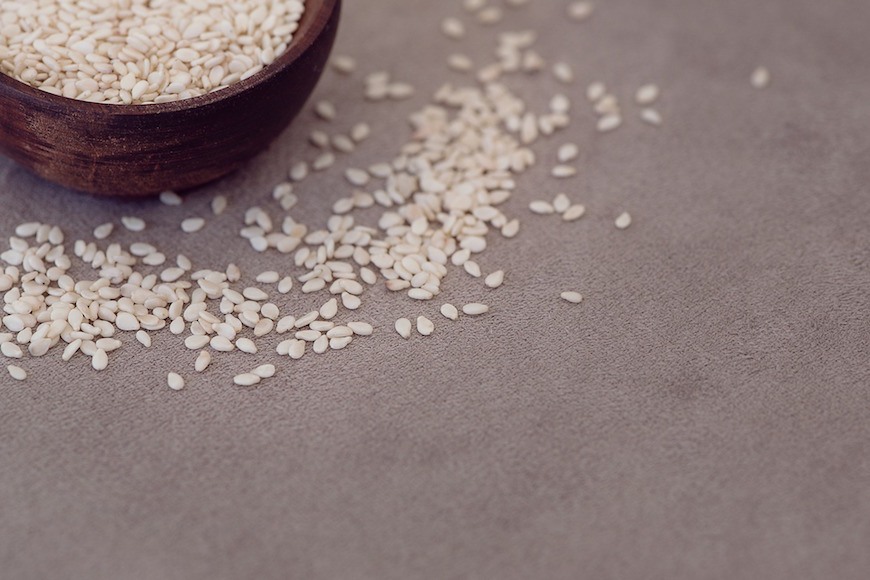Sesame Seeds Are the Underrated Salad Topping You’ve Been Missing
Sesame seeds aren't just a final finishing touch on burger buns, breadsticks, and sushi rolls: they actually have pretty incredible health benefits to them. Wondering what exactly they are and how to start incorporating them into your meals? Keep reading.
Scroll down to see the nutritional benefits of sesame seeds, potential side effects, and ideas for using them in your meals.
Health benefits of sesame seeds
1. They protect against free radicals. A review of several small studies found that eating sesame seeds could help fight oxidative stress, an imbalance between free radicals (which can damage cells and are linked to signs of aging and disease) and antioxidants in your body.
2. It may increase production of vitamin E. Sesame seeds have been shown in a small study to up the levels of tocopherols in the body, which is a precursor to vitamin E. Why that matters? Vitamin E helps lower inflammation, promotes eye health, and is good for your skin.

{{post.sponsorText}}
3. They're high in healthy fats. You don't have to be an all-out keto devotee to know that healthy fats are massively important to your body—especially when it comes to brain health. And one tablespoon of sesame seeds has 4 grams of fat—mostly the monounsaturated and polyunsaturated kind (you know, the good stuff). Sprinkle some sesame seeds on your avocado toast to take your unsaturated fat serving to the next level.
4. They're anti-inflammatory. Inflammation is linked to causing everything from acne and gut distress to cognitive decline and cancer. The good news: sesame seeds (specifically, sesame seed oil) have been linked to lowering it, although more study is needed.
5. They're good for your heart. The same study highlighting sesame seed oil's anti-inflammatory benefits says it's also good for your heart. So if you're prepping a meal and want a slightly different flavor profile than what your olive oil gives you, reach for a bottle of sesame seed oil instead.
6. They can help with osteoarthritis. A study found that eating 40 grams of sesame seeds per day can ease symptoms of knee osteoarthritis. Clearly, taking measures to lower oxidative stress can have big results.

Potential side effects of consuming sesame seeds
There's clearly plenty of benefits to adding sesame seeds to your diet, but there's one caveat to be aware of: Nuts and seeds are common allergens—and that includes sesame seeds. About 1 in 1000 people suffer from a sesame allergy.
Symptoms of a sesame allergy range from person to person, according to Food Allergy Research and Education—some people could break out in hives, but others might have a more severe reaction like anaphylaxis. It's also important to know that if you do have a sesame seed allergy, you need to not only avoid the seed itself, but food cooked with sesame seed oil. This is particularly common in Middle Eastern and Asian dishes, so it's something to keep front of mind and ask the waiter about when you eat out.
If you're not allergic and want to reap the health benefits these small seeds pack, there are several ways to get your fix.
How to use sesame seeds
1. As a topping. One of the most common ways sesame seeds are used is as a topping in salads, sushi, and chicken (though it works just as well as a topping on tofu, tempeh, and other meat-replacements, too). The flavor profile works extremely well in Asian-influenced dishes. Want to give it a try? Check out the recipe for this gluten-free, vegan, sweet potato pad Thai.
2. As an oil. Sesame seed oil is a great heart-healthy pantry staple to have and can really amp up the flavor in an otherwise bland dish. The smoke point is typically quite low, making it better to use as a finishing touch rather than while you're sautéing. You can also use it in salad dressings or even in place of it, since sesame seed oil has such a distinct flavor.
3. Tahini. Ground sesame seeds are called tahini, which is a staple in the Middle East. Tahini butter is growing in popularity here in the States, offering a savory substitute to nut butters, which tend to be a bit sweeter. Drizzle it over roasted veggies for an extra flavor punch.
While you're increasing your intel on underrated seeds, educate yourself on the difference between flax seeds and chia—including finding out which one is healthier. And here's a pro tip on how to make the healthiest salad ever.
Loading More Posts...